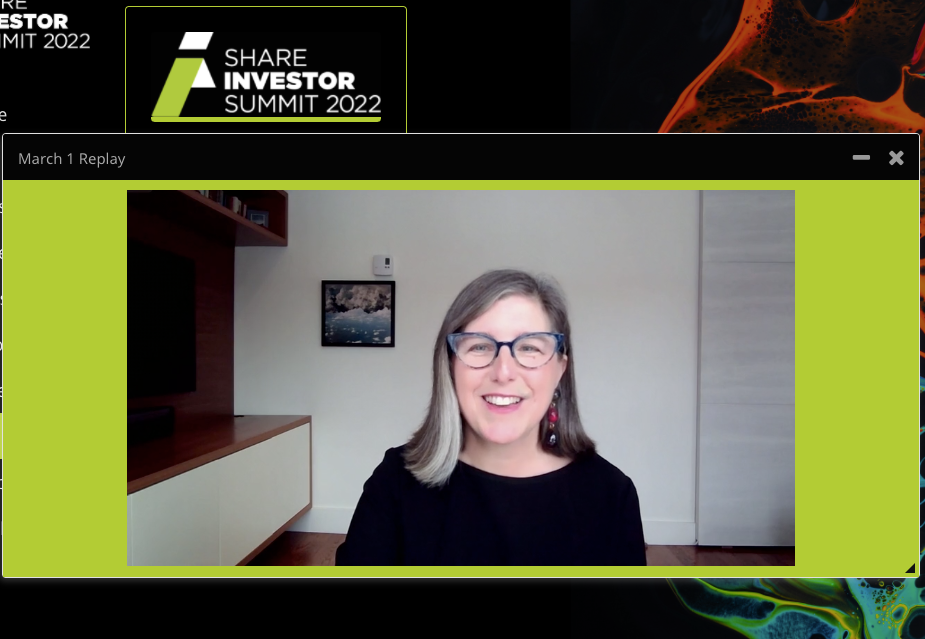
Colette Murphy is the Chief Executive Officer of the Atkinson Foundation. Colette is also the incoming co-chair of the Shareholder Association for Research & Education (SHARE), along with Leslee White-Eye, the former Chief of the Chippewas of the Thames First Nation, a trustee on M’Tigo Min Trust of Wasauksing First Nation and former trustee on Chippewa’s Thunderbird Trust, and a board member at Kings’ University College. She made these remarks at the SHARE Investor Summit 2022 to open the panel, “Reconciliation and Corporate Canada: C-Suite Reflections on Rising from Rhetoric to Real Progress,” with Kevin Thomas (CEO of SHARE), John McKenzie (CEO of TMX Group), and Tabatha Bull (CEO of the Canadian Council for Aboriginal Business). You can watch the full panel here.
Thank you, Chief Leanne Joe for your welcome.
I’m grateful to Kevin and his team for convening this necessary conversation. The road between rhetoric and real progress is a long and arduous one. But it is made so much better by good traveling companions. Thank you for being here today, and for taking on SHARE’s challenging questions.
It’s been exactly 152 days since Canada marked its first National Truth and Reconciliation Day. I’m among those who experienced the ringing of the opening bell by Tabatha Bull at the Toronto Stock Exchange as a sign of real progress. But I am also among those who want to use our investor power to make sure history does not record it as yet another symbolic gesture.
I’ve been asked to start today’s conversation by telling you about Atkinson’s involvement in a TMX Group shareholder proposal on reconciliation and Indigenous inclusion. In other words, why Indigenous economic reconciliation matters to our foundation.
My answer is we’ve heard the Truth and Reconciliation Commission’s Call to Action. This call breaks down into 94 recommendations. The 92nd speaks directly to business leaders and corporate shareholders like us. It asks us to rethink policy and practice to meet the standards set by the United Nations Declaration on the Rights of Indigenous Peoples.
These are standards that the Atkinson Foundation takes very seriously. We believe they are possible to achieve – through meaningful collaboration with Indigenous-led organizations like the Canadian Council for Aboriginal Business and the National Aboriginal Trust Officers Association (known as NATOA). We also believe that settler-led corporations like the TMX Group can be among the beneficiaries of Indigenous-settler collaboration when we have partners like SHARE.
We know real progress is possible because we’ve seen it with our own eyes at different times on several issues over the past 20 years. SHARE has helped us align our mission and money, and to mobilize investors to improve working conditions and banking practices. They’ve shown us time and time again what principle and pragmatism can accomplish for the good of everyone.
But today, it is not possible to deliver on our mission to promote justice and fight inequality unless we seek right relations with Indigenous people, and remove obstacles to Indigenous inclusion and economic prosperity. That’s why we’re participating in this historic investor mobilization effort, starting with the TMX Group vote last year.
You may know that the TMX Group owns the Toronto Stock Exchange. What you may not know is that 98% of TMX shareholders voted in favour of our proposal. It’s the first time a resolution on Indigenous inclusion has been jointly endorsed by the board of directors of a Canadian company — a move that is already rippling through capital markets in North America, and sparking conversations about what comes next. CEO John McKenzie’s constructive engagement with our proposal before it went to a vote made a big difference.
This resolution obliges the TMX Board of Directors to:
- Develop internal programs and policies on equity, diversity, and inclusion;
- Review procurement from Indigenous-owned businesses and businesses owned by other underrepresented groups;
- Establish disclosure practices and objectives; and,
- Engage with Indigenous organizations to support this work.
It’s a strong start but clearly only a first step on that long road between rhetoric and real progress.
We owe a big debt of gratitude to Mark Sevestre from NATOA, Kevin Thomas, Anthony Schein and Katie Wheatley from SHARE, and their Reconciliation and Responsible Investment Initiative.
Tabatha Bull at Canadian Council for Aboriginal Business and John McKenzie and his TMX team also provided great leadership.
All of them helped us demonstrate that shareholders have more than money at stake, and want more than a simple return on our investment. A growing number of us are ready to use our time, our voices, and our investments to amplify Indigenous values and our own values too.
It’s their turn now to tell you about the significance of the TMX decision and how it has been unfolding over the last eight months.
Over to you – Kevin Thomas, John McKenzie, and Tabatha Bull.
